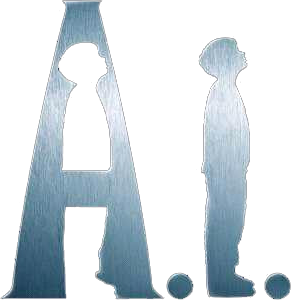Asimov’s Three Laws of Robotics
- A robot may not injure a human being or,through inaction,allow a human being to come to harm.
- A robot must obey orders given it by human beings except where such orders would conflict with the First Law.
- A robot must protect its own existence as long as such protection does not conflict with the First or Second Law.

问: 人类个体智慧发展到极致是什么样子的?
Q : What does it like when the intellegence of individual human being develops to the acme?
答: 大脑改造。不用经历长期的基础知识累积过程,任意领域可通过程式加载直接get技能点。
A : Celebrum reconstruction. Acquire acknowledge/skill within a second by loading packages of any domain.
问: 为什么不直接借助人工智能?
Q : Why don’t we directly turn to artificial intellegence?
答: 如何保证人工智能发展出来以后,永不违背阿西莫夫三定律?
A : Could you assure A.I. never break Asimov’s Three Laws?
问: 发展极致的人类智慧有什么好处?
Q : What’s the advantage of touching the ceiling of human intellegence?
答: 跨领域知识的快速融合,促使科技水平以更高的指数爆发。
A : Rapid cross-disciplinary learning leads to science and techiques explosure by even higher exponential level.
问: 有什么弊端或隐患?
Q : The disadvantages or latent danger?
答:
- 是不是所有人都希望变得绝顶聪明?
1.1. 如果是,人类是否有能力避免乌托邦再现(严格社会分工)?
1.2. 如果不是,更聪明的人是否必须或者愿意负担起另一部分人的生活?是否能过上两不相干的生活? - 科技的发展并不是永远向善。
A :
- Does every single one want to be extremely clever?
1.1. if yes, can human society avoids Utopia (strict social division of labor)?
1.2. else, must or will the more intellegent people afford the other part? Can they lead disparate lives? - Science development is not always inclined to goodness.
问: 个体智能发展到极致的人类可以和人工智能并存吗?
Q : Can human beings of top intellegence coexist?
答: 有且只有人类个体的计算能力与调集资源能力与人工智能持平时。
A : Only if human individual computes as fast as A.I. and has same ability to acquire resources.
问: 上面谈到的人类个体能力可以实现吗?
Q : Is it possbile to realize that?
答: 只有当人类全体可以无差别实时沟通,且具备无限计算能力的时候。那样的话,我们也就不需要人工智能了。
A : Only if the human beings can communicate instantly as an entity, and compute without limit as an entity. By then, we don’t need A.I.
问: 人工智能和无障碍全人类思考能力,哪个更容易实现?
Q : A.I. and barrier free thinking ability of the entire human beings, which one is easier to realize?
答: 你觉得呢?
A : Shabi.
人类的辉煌,在于文化的多样性。整体性思维不是不可以实现,而是实现的同时如何维持个体独特的存在。
如果无法维持个体的独特,那么整体性思维最终会导致思考的停滞。
且,即使维持了个体的独特,也应当警惕“乌合之众”的群体性效应。
这应该是人类在没被A.I.取代之前的总体发展方向。